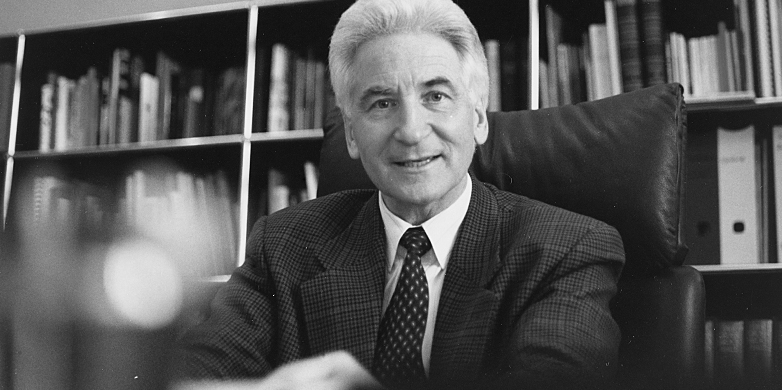ETH Zurich bids farewell to Jakob Nüesch
During his presidency, from 1990 to 1997, the pharmaceutical researcher with a background in agricultural science made a lasting impression on ETH Zurich. Jakob Nüesch passed away on 4 February 2016 at the age of 83.
Jakob Nüesch came to us from outside, but the experience he had gained in Basel’s pharmaceutical industry helped him guide ETH Zurich into the future with assurance and vision.
Jakob Nüesch began his academic career at ETH Zurich, where he studied agricultural science. After graduating as an agricultural engineer, he became an assistant at the Institute for Special Botany, obtaining his doctorate in 1960 with a thesis on phytopathology and mycology. In 1961 he began working as a pharmaceutical researcher in microbiology and biotechnology at the company then known as Ciba AG, where he enjoyed a very successful career until 1990.
During this time he developed and maintained close contacts with the University of Basel, taking on a role as a lecturer there in 1972. After many years as an outside lecturer at the University of Basel’s newly founded Biozentrum, he was made an adjunct professor there in 1978. On 1 September 1990, the Federal Council named Jakob Nüesch, who was by then head of pharmaceutical research and a member of the board of directors at Ciba-Geigy, President of ETH Zurich.
Autonomy and sustainability for ETH
Jakob Nüesch brought with him considerable managerial experience from his time in the pharmaceutical industry. He set about using this in his own unique way to guide ETH towards his vision of an “entrepreneurial university”. His extensive education and considerable specialist knowledge made him a very convincing speaker. The clarity of his arguments and his commitment to an objective meant he sometimes encountered opposition, but never an enemy.
Perhaps his greatest success on a political level was securing autonomy for ETH Zurich. It was this that helped him realise his vision of a modern, open university, which understood its responsibilities to society. Jakob Nüesch was also deeply convinced that sustainability is a global cause in which science can play an important role.
Advancement of women and interdisciplinarity
“The future begins in our minds.” This was his guiding principle, which he applied throughout ETH, from the professors and staff right through to the students. In this respect, Jakob Nüesch was always genuine. When he set a good example, he was being himself, and never playing a role. This also held true when it came to the advancement of opportunities for women. During his time as President, he appointed 23 women to professorships at ETH, including the current ETH Rector, Sarah Springman. It was always clear to him that ETH’s strong performance rested fundamentally on its outstanding staff. Nüesch set in place systematic peer reviews, and started building a professorial staff that was younger and more representative of women.
Jakob Nüesch’s openness meant he could act as a mediator between institutions and disciplines, and allowed him to make brave choices. The Collegium Helveticum, a transdisciplinary think tank whose first director was Adolf Muschg, owes its foundation to him. He also played a decisive role in the visionary redevelopment of the field that became known as environmental science, and was strongly committed to breaking down the barriers between disciplines. The way how student initiatives were involved remains exemplary to this day.
The grand seigneur
Jakob Nüesch stood out not only as a redeveloper of ETH, but also as a personality. On one of his birthdays, he was described as follows: “A man such as Jakob Nüesch might be described, in a modern idiom, as a ‘facilitator’. We prefer a more old-fashioned expression: ‘grand seigneur’. This describes a person who considers not only the technical aspects of what’s possible, but who, through the breadth of his character, also brings together enjoyment, eloquence, wisdom, tolerance and an unyielding fondness for the task, high personal expectations, a sense of justice and business acumen.”
A commitment to society
After he stepped down as President in 1997, Jakob Nüesch continued to act according to his philosophy. He lent his skills to a number of organisations which devote themselves to sustainable development, charitable causes or civic participation. Here too, he set a good example. His membership of the International Committee of the Red Cross (ICRC), the Federal Ethics Committee, and his role in the establishment of the Academia Engelberg Foundation are examples of the breadth of his commitment.
ETH is profoundly grateful to him. Jakob Nüesch has laid out a clear path for the future. His character and his work will always be remembered by those who had the privilege to spend time with him.

Comments
No comments yet